 DISCUSSION: John Dante Prevedini leads a discussion about Music and the Visual World, including contributions from Celia Craig, Halida Dinova and Yekaterina Lebedeva.
DISCUSSION: John Dante Prevedini leads a discussion about Music and the Visual World, including contributions from Celia Craig, Halida Dinova and Yekaterina Lebedeva.
- Anett Fodor
- Yvonne Desportes
- Konstantin Iliev
- IBS Artist
- Caroline Charrière
- Alban Gerhardt
- Donald Fraser
- Joseph Fort
ARTICLES BEING VIEWED NOW:
- Marián Varga
- Rachel Barton Pine
- December 2023 Newsletter - Our December 2023 PDF newsletter, 'Time and Time Again', has just been published
- Spotlight. A Very Individualistic Style - Geoff Pearce is inspired and amazed by the orchestral music of Grażyna Bacewicz
- Percussion music
Brilliance, Ingenuity and Excellence
RODERIC DUNNETT listens to Handel's 'Agrippina'
Every visit I have made to Hampstead Garden Opera (HGO) has been both a treat and a revelation. I remember seeing some of their admirable early productions after it was founded by Roy Budden in 1990. And now I can claim to have seen and relished their latest: a staging of Handel's Agrippina well up to the top professional companies.
HGO proudly proclaims that 'By advancing young singers we empower the new generation.' Well despite its aspiration to achieve a kind of uniqueness in this respect, it is by no means the only such company. Clonter Opera has long achieved this, not least by taking on often glorious soloists from the Royal Northern College (RNCM). The Royal Opera's Jette Parker Young Artists programme - originally named after philanthropist Vivien Duffield, though this is shamefully overlooked in current publicity - achieves just that.
For all roughly ten major colleges, four in London and five or six outside the capital, this is the natural priority: although they are not, like HGO, top external professional companies. The accolade 'an engine of opera development in the UK', in The Sunday Times only last year, is well earned and well deserved.
What a delight that they have boldly presented Friedrich (von) Flotow's elegant Martha, Cavalli's La Calisto and L'Egisto (in their own newly commissioned edition), Mozart's stunning La Clemenza di Tito, Ester by Cristiano Lidiarti, the first English Baroque oratorio with a Hebrew libretto - the last, in concert; Holst's Indian-infused Savitri (in 2020), or Susannah by American composer Carlisle Floyd (whose many operas include one on Steinbeck's Of Mice and Men).
Add Jonathan Dove's Mansfield Park (and later his fairy tale The Enchanted Pig); Handel's Semele and Xerxes and in 2019 a rather daringly original take on Part(h)enope. Plus, with their usual freshness, an inspired staging of a Vaughan Williams opera scarcely ever seen: Hugh the Drover.
That's quite a list. And now HGO has returned to Handel, with a fantastically exciting and galvanising production of Agrippina, glorious in both the orchestral playing and the solo singing. And yes, gratifyingly, the superb performers in all departments were indeed young. Some very young.
The overture pointed the way to what was to come. Led by a first-rate coaxing conductor, Thomas Payne, 'Clearly a name to watch', claimed Seen and Heard International, with much justification: a former Jette Parker young artist (see above) he has already assisted at the LSO and LPO, plus others, it also featured, as a stunning amount of this opera did, a dazzlingly appealing pairing of the first and second violins - Conor Gricmanis, a pupil of Rachel Podger and The Academy of Ancient Music's leader Bojan Čićič. Gricmanis watched like a hawk and thus mirroring Payne's acute pacing and guidance provided a marvellous lead to everyone, paired with second violin Maxim del Mar, whose credits include the forty-year-old Hanover Band, Robert Hollingworth's I Fagiolini and Laurence Cummings' London Handel Orchestra. This coupling, sometimes paired at the third, but much more too, was frankly stupendous: exploratory, affecting, and simply gorgeous.
If anyone matched the sensitivity of the violin duo, it was Mark Wilson's bassoon. Everyone managed the fire and damnation of the score as a whole, but Wilson contrived, often extremely soft yet always audible, to be there as a presence. Hearing him, and Handel writes for him with unexpected poignancy, was an education in itself. When he is joined by the lower strings he shines just as much.
At first one found the Mantuan/Neapolitan Cardinal Vincenzo Grimani's libretto for this December 1709-January 1710 Handel opera quite forceful. One's hopes were raised (he wrote only three libretti - perhaps that shows - and died just a few months later): Agrippina characterisations seeming almost on a par with Busenello's L'Incoronazione di Poppea for Monteverdi, surely the non-par of early opera dramatic texts. Actually the positive view continued as the self-interested scheming of its host of characters gradually unfolds. Indeed one must add that some have claimed 'this is one of the most satisfactory texts Handel ever set'.
But latterly, one found oneself wearying of the love matches dwelt on by this 'book'. There are sly forward allusions to Agrippina's coming shipwreck and near-death on a vessel constructed to sink by her mother-murdering son. Surviving the wreck, she landed onshore only to be killed by Nero's henchmen. ('Strike here' she said, pointing to her womb which had borne this monster.) What marvellous material for an opera, including the murder of her sister and of Claudius' son and daughter Britannicus and Octavia, this would potentially have made.
How much more effective was Giacomo Rossi's libretto just the next year for Handel's first London opera, Rinaldo, on that increasingly popular subject of the Crusades. Or the later ones of Nicola Haym, particularly 1724-5, including Giulio Cesare, Tamerlano and Rodelinda.
Well, the story aside, there were a lot of individual treats and poetry from Grimani - who could fault Poppea's 'Bel piacere' and its wacky rhymes 'godere ... amor ... cor ... splendor ...?' There are, unusually, some forty arias, although a fair number are not da capo. Importantly, there was a host of splendid performances, and crucially, characterisations. Take the almost comic duo, the scheming although nervous and fawning freedmen and imperial secretaries, Pallas and Narcissus, and the way Agrippina plays them both along - it was essential for her: both 'freedmen', they were the most important agents and advisors of Claudius and Nero, Pallas the Treasury Secretary but murdered by the latter - Narcissus controlling all Claudius' correspondence but executed on Agrippina's orders.
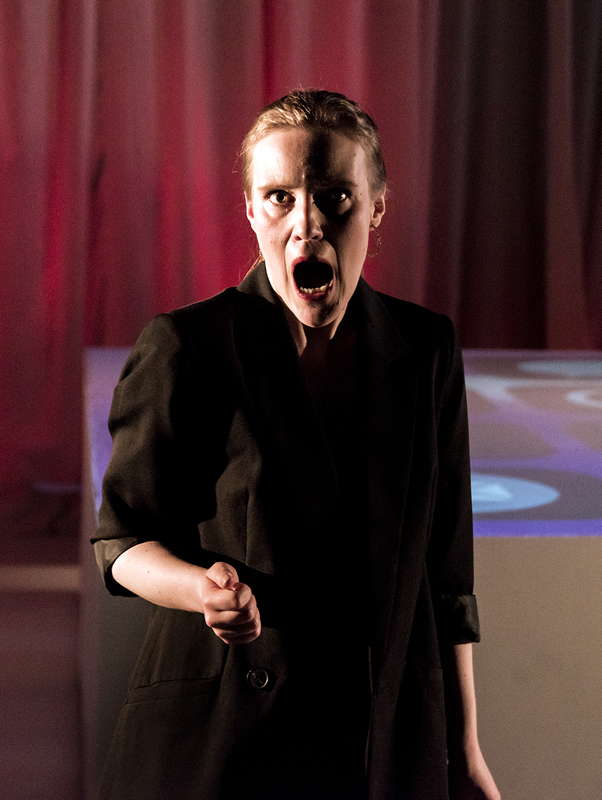
The obvious violence and unwavering anger of Astrid Joos's Agrippina, for Hampstead Garden Opera. Photo © 2023 Laurent Compagnon
HGO fielded two casts - hence more opportunities for nearly all these young performers. From the first cast, Gheorge Palcu (Pallante, a sort of Fellini-Pasolini figure) and Hamish McLaren (Narciso), without descending into camp, served up some delicious comedy ('Viva' duet), each duplicitous in a wholly different way. Especially inspiring was the way both kept always acting like mad when onstage, and found half a dozen or more different ways to bring out their naughty individual attributes. Especially pleasing were Theorbo (Ettore Marchi), cello (Rachel Watson, terrific), double bassist Kaman Chan, who all supplied additional riches - 'You, Narciso, shall reign with me', and all three shared the honours, with the first quite sinister aria alluding to a 'tempest' offering the chance for that sea-torn cyclorama.
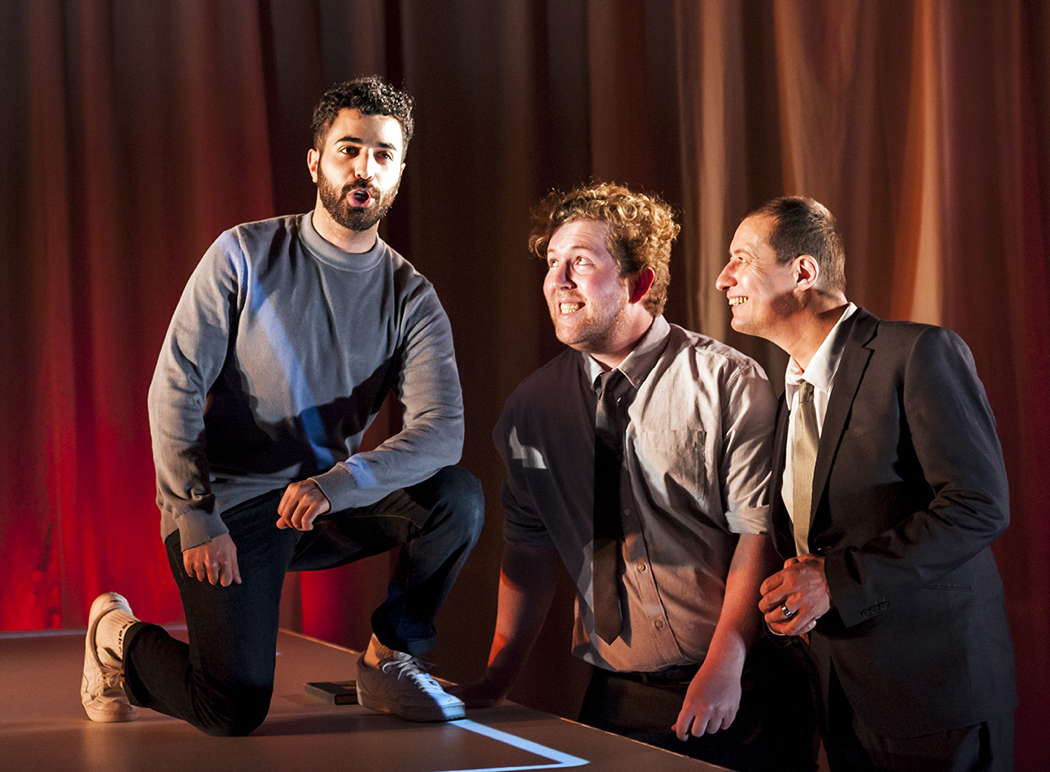
Narciso (Hamish McLaren) and Pallante (Gheorghe Palcu) listen rapt to Eliran Kadussi (the other cast's Ottone). Photo © 2023 Laurent Compagnon
Time and again, the two gifted oboists - David Price and Grace Scott Deuchar - strikingly able effortlessly to swap to recorders, helped Payne nurse the arias along. A brief trio with a third character, Lesbo (Sonny Fielding), an aide to Claudio, was especially telling - Lesbo, incidentally, was splendidly played and sung - and there were a few other such couplings. And Lydia Shariff's brief culminating appearance as wedding-blessing Juno (the goddess of marriage) matched all those three deities conjured up near the close of Shakespeare's Tempest.
'Handel's music', it has been said, 'splendidly mirrors the court's faults and foibles'; its arias, 'full of feeling - however ambivalent the situations the characters find themselves in'. All this is true. And here one could go much further. That feeling hinges on the performers and their attempts to devise believable personalities as they wade through the mire of intrigue, capture the desire and the desperation, yet also the humanity that offsets the scheming. Was all that detectable here? Most certainly it was. 'A friend lasts only as long as fortune lasts': with the fast-changing allegiances in this opera, that is certainly true.
But do we care about these personalities? The problem with Grimani's Neapolitan offering is that this is not Spanish melodrama; it is not Shakespeare's Roman-Italian plays; above all, it is not Seneca. There was no murder (if poisoning) of Britannicus; no shipwreck of Agrippina; no brutal removal of Octavia; or subsequent engendering of Poppaea's death. No conspiracy of Piso; no bloody bathtub of Seneca himself (as in Monteverdi) Nero's tutor, driven to suicide only a little later (65 AD), and who composed tragedies that out-bloodied anything by Sophocles (or Racine). In short, nothing of the historical agonies that give such power to Monteverdi.
The miraculous interchanges, and flightiness, and devious designs, and outpourings of this splendid production produced this one strange effect. It demonstrated that Agrippina, so far from exploring Tragedy, amounts to one long Comedy. It is more like The Comedy of Errors than Titus Andronicus; more like La Finta semplice than La Clemenza. To my surprise, having thus stuck my neck above the parapet, I discover the eminent Handel scholar Donald Burrows, also author of the Master Musicians Handel, puts it as 'an anti-heroic satirical comedy' - so I find myself in good company.
I suppose the same might be said of several more courtly operas by Handel, or by Vivaldi (recently being rediscovered by Garsington). Less so, perhaps, those by the incredibly prolific Reinhard Keiser (a Hamburg slightly elder contemporary from whom Handel borrowed and/or stole for Agrippina), by Telemann (Germanico) or Pergolesi (La Salustia).
Still, what we enjoyed was a delicious evening of young excellence, for the singing, like the orchestra at every point, verged on stupendous. Quite apart from anything else, the recitative, nursed finely whether by Payne and Gricmanis or by Maria Stručkova on the harpsichord, nudged by hints from Tony Lucas's timpani, flowed so freely and naturally, with such intimate shifts in delivery and intonation, that one was literally at sea in a flood of inspiration and many-coloured variety. Strikingly impressive (throughout, in fact) was Catja Hamilton's lighting, not least when accompanied by Douglas Baker's projections onto a back curtain, of which one of the most impactful was his use of a quite forceful seascape, always, I think, behind Agrippina herself.
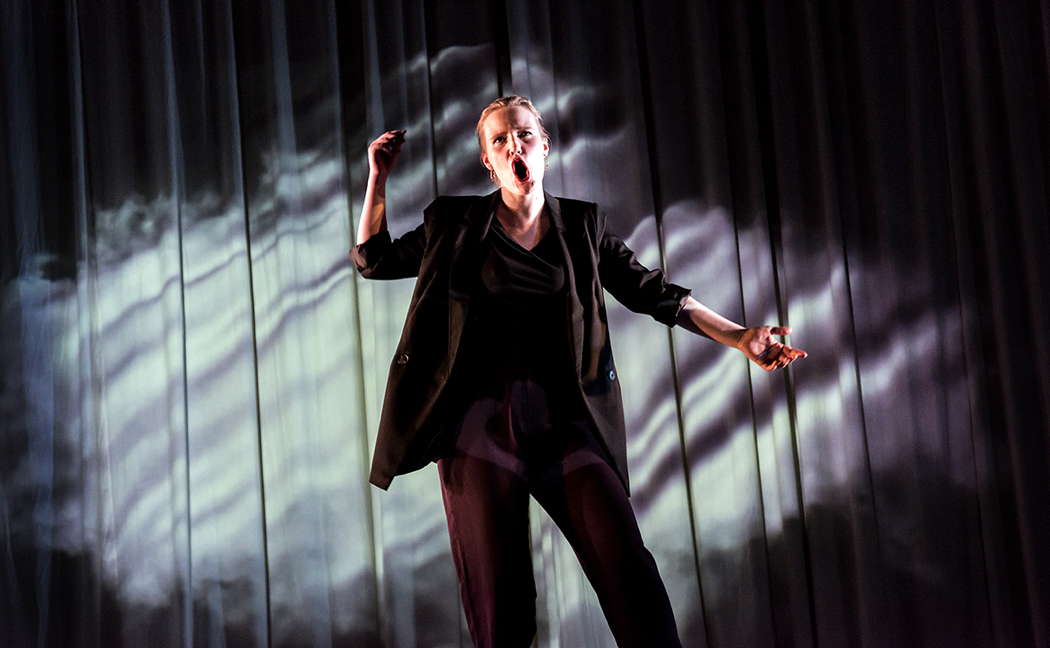
Agrippina (Astrid Joos) explodes into violent action, with Douglas Baker's threatening seascape behind her. Photo © 2023 Laurent Compagnon
And one after the other, HGO's arias were wonderful. Not least, for the Empress herself - for it is as Claudius' second or indeed third wife (after Messalina) that we learn of the stratagems, all aimed above all for her ghastly son's advancement. The more explosive - probably her best known is 'Pensieri, voi mi tormenta' - were sensational in the hands of Belgian soprano Astrid Joos: there was such maturity to her presence, such authority in the characterisation, such power in the voice, she was - perhaps above all in these two galvanising 'storm and tempest' arias - frankly dazzling every time she took the stage. It's almost incredible to think of her in some of her previous (rhyming!) roles - Barbarina, Pamina, Adina. She's no shrinking violet, but a fireball. Magnificent savagery - a glorious, fearsome performer.
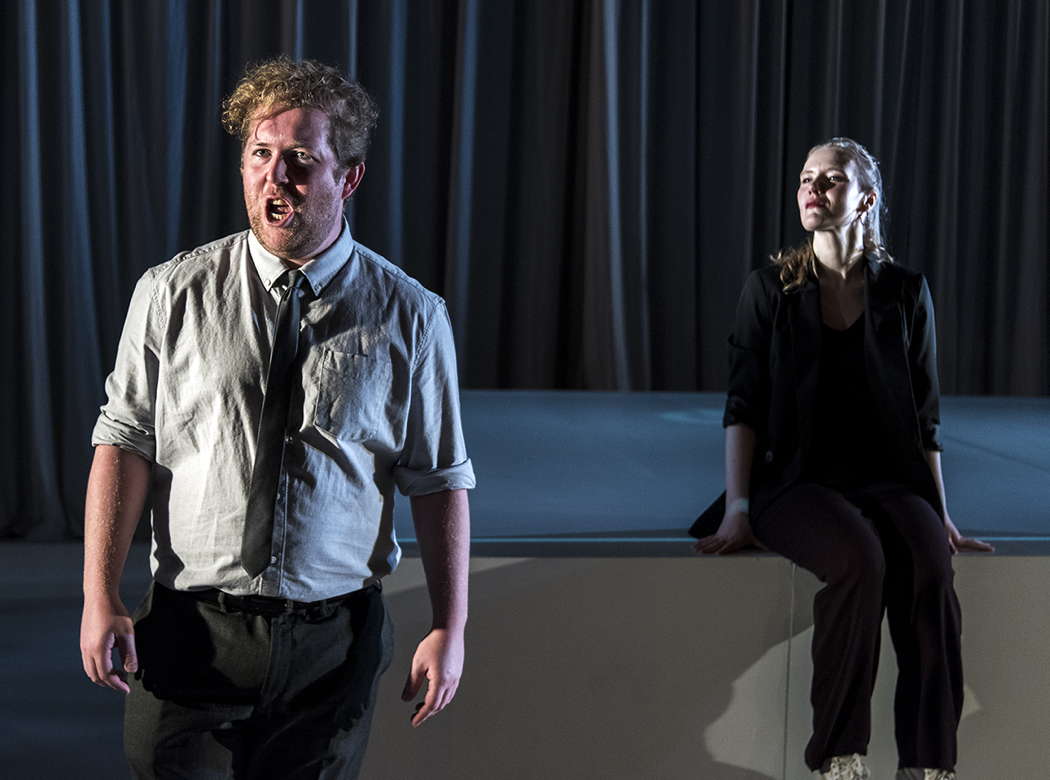
Narciso (Hamish McLaren) is psychologically manipulated by Agrippina (Astrid Joos). Photo © 2023 Laurent Compagnon
Poppea isn't above plotting herself, except that her main redeeming feature is that she is genuinely in love with Ottone, and only latterly do we sense that Agrippina's next move will be to seize her for the feckless Nero. Biqing Zhang gives us a sizzling Poppea not so much oozing with sexuality (qv many other productions) as full of zest. With a kind of Mozartian enchantment she is, for now at least, bound to Ottone, and despite all assaults as much in love with him as he with her.
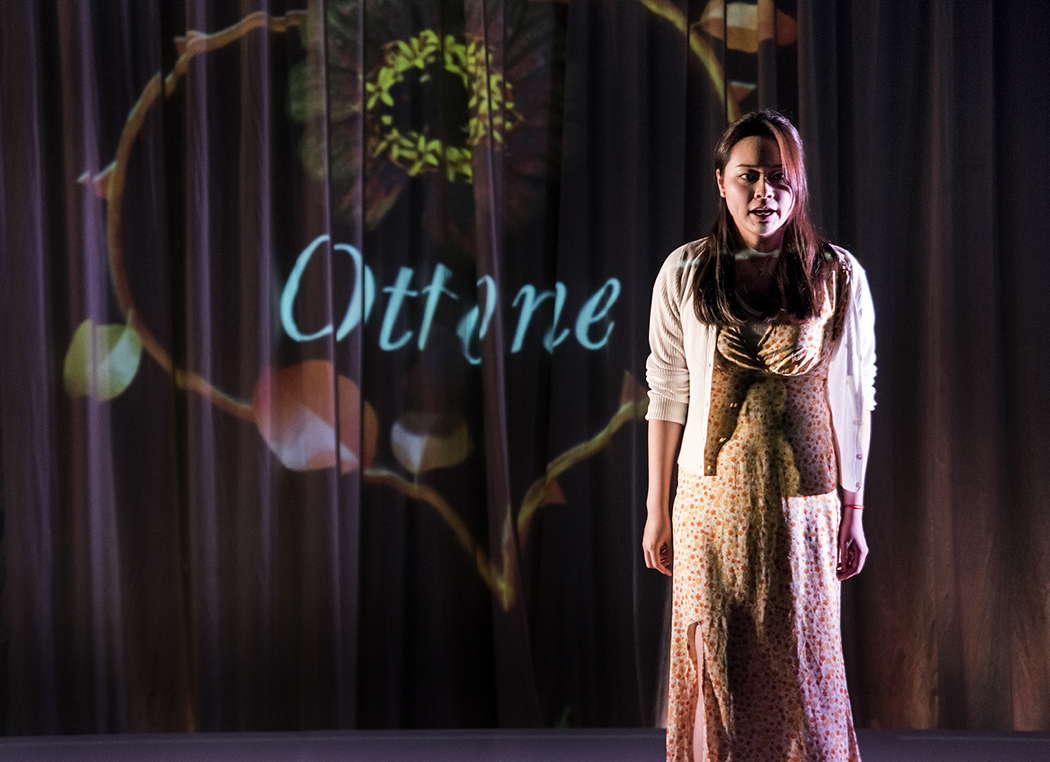
Biqing Zhang as Poppea, the name of her true lover replacing that of (N)erone posted behind her. Photo © 2023 Laurent Compagnon
Claudio - the Emperor Claudius (George Robarts) - is a curious invention. Never really presented as a dominant conqueror of Britain - true, Aulus Plautius and Vespasian did that for him, he just popped in for the end - he proves scarcely the profound intellectual he most certainly was. (The disappearance of his multi-volume history remains one of the most serious losses from antiquity.) He is a kind of piggy-in-the-middle figure, an Emperor who makes a third in the Nerone-Ottone scrabbling over Poppea - wholly invented, of course. Coloratura was quite superb across the entire cast - an aspect that lifted HGO's offering to not just North London, but all-London splendour. And Robarts' mastery of this swingeing coloratura was among the best of them all, while another, shared with those superb oboes and recorders (whether one or both), was superb. There was a security, a firm undertow, to his contributions passim: he lent weight to the production, such a vital asset.
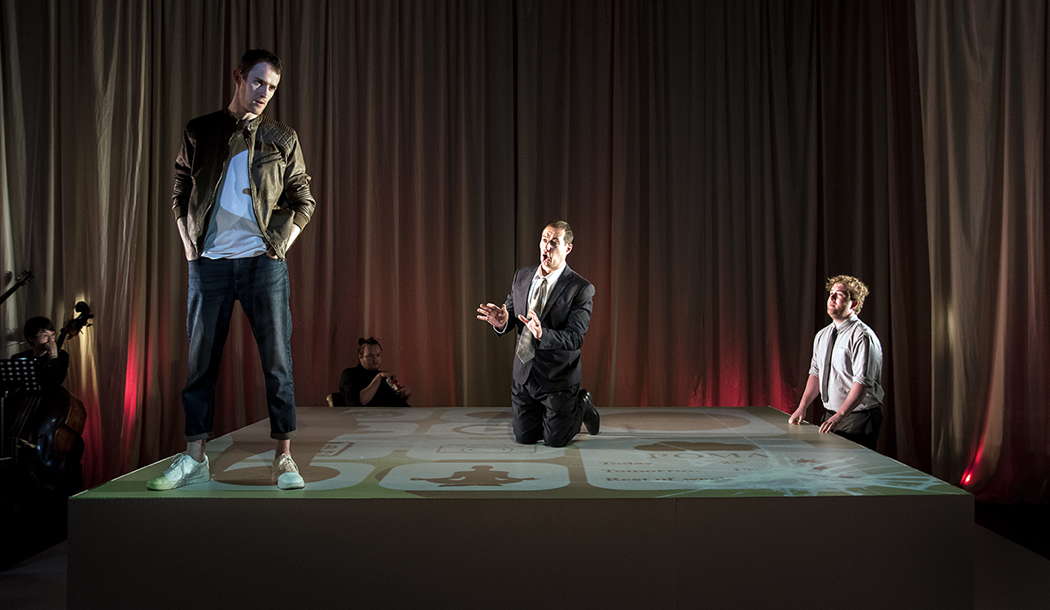
Pallante (Gheorghe Palcu) and Narciso (Hamish McLaren) strive to win the favour of Claudio (George Robarts). Photo © 2023 Laurent Compagnon
If there is a hero of this opera, it is not so much the multi-murdering Agrippina ('a snake, a Circe'; great-granddaughter of Augustus, daughter of Claudius' brother, the militarily and morally magnificent Drusus, and not too surprisingly, the sister of Caligula) or, say, the here not unduly malicious Poppea; but the vulnerable Ottone. He unexpectedly survives: the future Praefectus of the Praetorian Guard, and for a mere three months Emperor in 69 ('the year of the four Emperors') following Nero's widely welcomed suicide, Otho here is hardworking, responsible, supportive, caring. And anti-ambitious. Though for dedicated service he is betimes nominated to succeed Claudio - unlikely, for before Nero, the obvious successor is still the nearly fourteen-year-old boy Britannicus.
Indeed Francesco Giusti's singing of Ottone proved a vast highlight in this clever, in his case endlessly moving, production. Handel, at least in this version, sends the countertenor high in his range, something Giusti achieved splendidly. The honesty, loyalty and even innocence of Ottone he captured marvellously - not so much at the outset as the way he developed the character gradually later on. We believed in him, as we must: the only decent personality in the opera. (Even the great figure of Claudius is dragged into the twists and manoeuvrings of the contorted plot.)
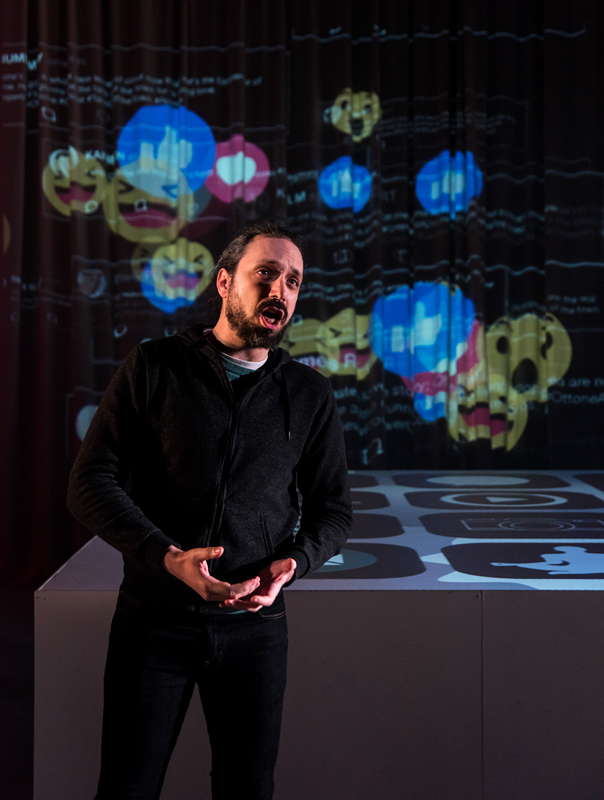
Francesco Giusti as the respectably amorous Ottone.
Photo © 2023 Laurent Compagnon
Katie MacDonald's Nero, not really in control of events, which he leaves, or has no choice but to leave, to Astrid Joos's scheming Agrippina, has one of the patently comic scenes, where he and Ottone hide separately, peeping at events onstage. One, probably more, of his/her arias features the two violins skedaddling wildly. What a delight.
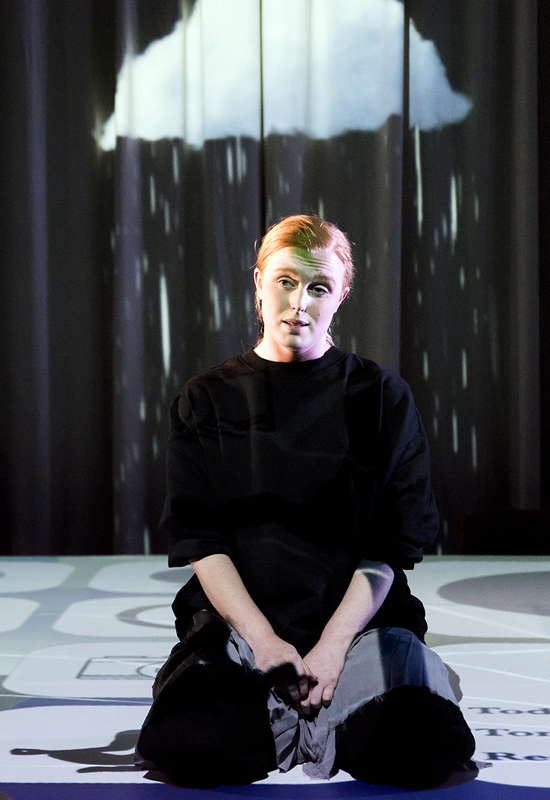
Katie Macdonald gave us a wonderful Nero. Abetting his mother's plotting, not very successfully, but so touchingly beautiful we almost take his side.
Photo © 2023 Laurent Compagnon
Meanwhile the same kind of aggression came from Biqing Zhang's Poppea.
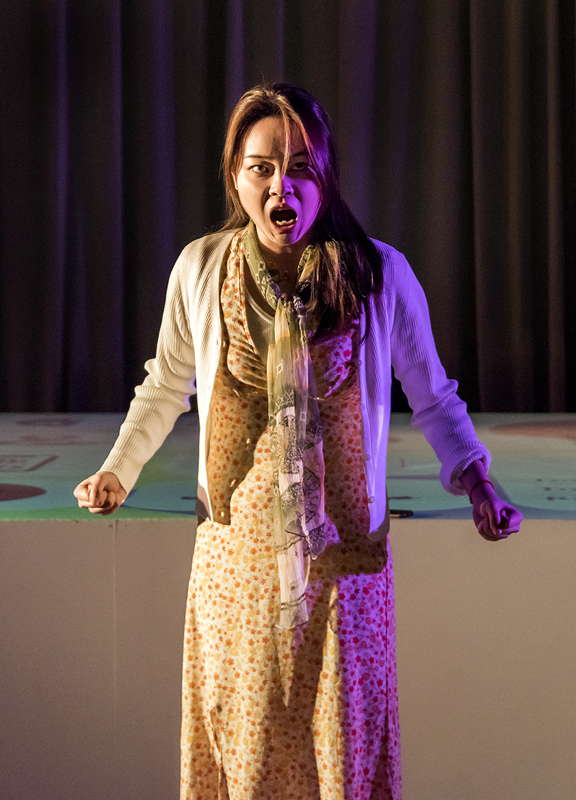
Biquing Zhang as the much fought-over Poppea.
Photo © 2023 Laurent Compagnon
Unlike that of Monteverdi, but here a firebrand when crossed, and though a ball being tossed, part willingly, part furiously, between the three acquisitive suitors, or aspiring lovers, she maintains determinedly her own individuality: she is not to be crossed or manhandled, and knows her own mind, especially with regard to her (here very intense) romance with the 'good' Ottone. (Nero originally acquiesces in this, but by 62, he claims her, and three years later, deliberately or more likely inadvertently, bumps her off.)
The main tribute, apart from those mentioned, must surely belong to two people. To director Ashley Pearson - her many credits include Handel's Parthenope (for HGO) and Berenice, Büchner's Woyzeck (source for Berg's opera), and Emmanuel Chabrier's operetta Une éducation manquée - whose direction and manipulation of her characters, using all corners of the stage to generate sometimes fascinating contrasts, kept this production constantly on the move and constantly entertaining. And to Sorcha Corcoran, an outstanding theatre designer (Shakespeare, Marlowe, Oscar Wilde; plus King Lear, Middleton's The Changeling, If Opera, to come), whose novel idea for a design (doubtless by agreement) uses a raised square dais onto which widely different images are projected from above, sometimes intriguingly seeming to be controlled by the characters on a mobile phone or laptop. The images were often astonishing, original and eye-catching.
This pair, with Thomas Payne's universally star, expressive, superlative orchestral team, lay behind the undeniably huge success of HGO's latest offering: indeed the whole production proved a vast asset, by which 'North London's' immensely successful, tip-top company maintained its reputation for brilliance, ingenuity and excellence.
Copyright © 30 May 2023
Roderic Dunnett,
Coventry UK



